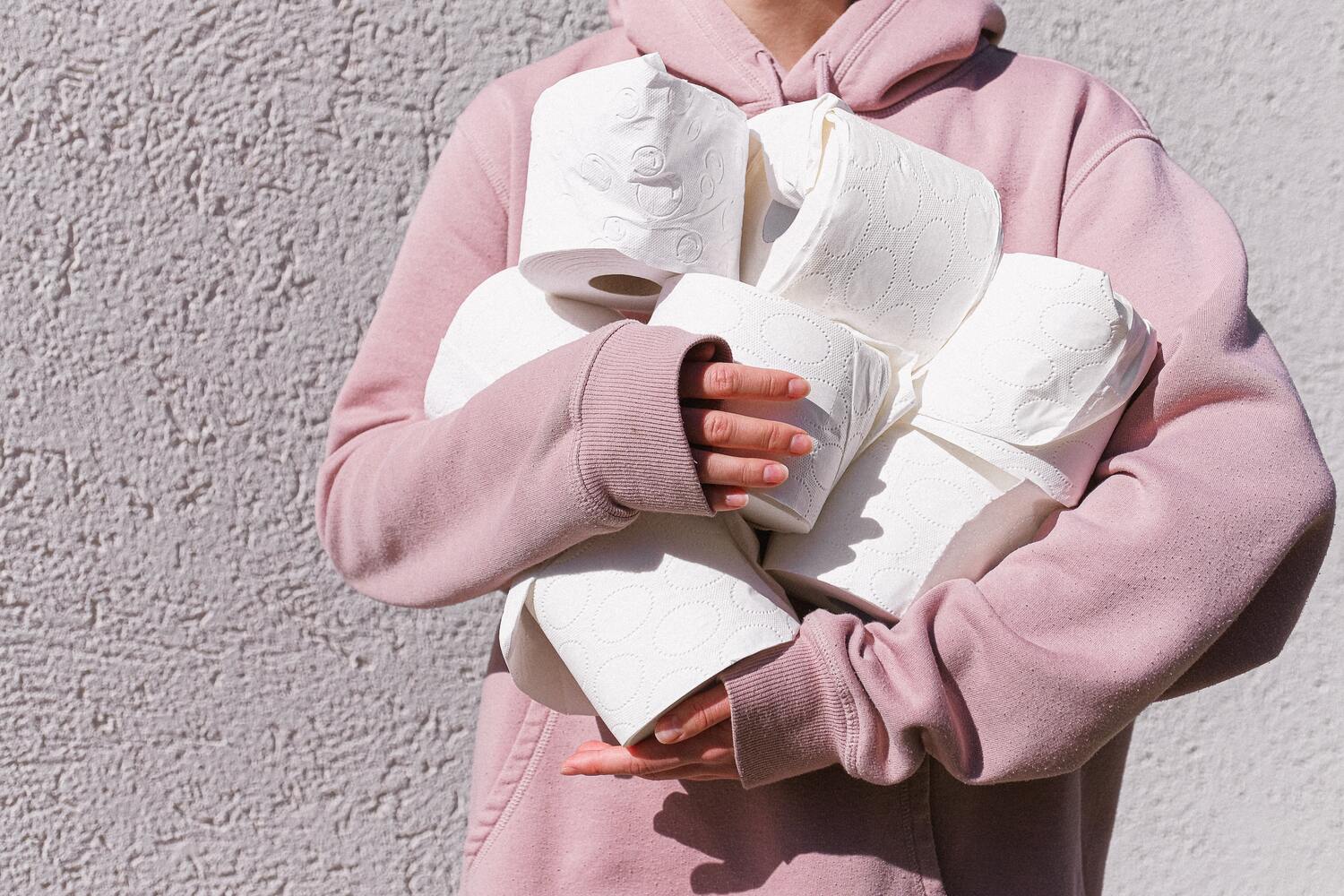When the body is compelled to utilize fat as its primary energy source instead of glucose, the liver metabolizes fat into acidic compounds referred to as “ketones”. But why induce this shift in the body's energy source? There are certain situations, such as following a keto diet or not consuming enough carbohydrates in a routine diet.
At times, the transition between energy sources can happen due to irregular bodily functions, as observed in uncontrolled diabetes. Despite the significance of ketones as backup energy stores, an excessive presence of these compounds within the body is undesirable.
Curious about monitoring your ketone levels? Urine test strips provide a straightforward method. Keep reading for a detailed understanding of these strips, covering their purpose, usage for ketone measurement, factors leading to urine ketones, and more.
What are Ketones?
What is a ketone? A ketone is a chemical compound produced by the liver when it breaks down fats. Our bodies usually use glucose as its fuel source. When glucose isn’t readily available, our bodies use ketones as an alternative source of energy.
Feeling fatigued or experiencing weakness could potentially indicate the initiation of ketone production in your body. Vigilance regarding these symptoms is crucial for maintaining your overall health and well-being. Elevated levels of ketones might suggest an excessive imposition of dietary restrictions, necessitating attention to avoid potential complications.
The presence of ketones in urine can occur in healthy adults even if they're not following a ketogenic diet:
- Frequent bathroom visits
- Having bad breath
- Having a hard time focusing
- Feeling more tired or sleepy
- Feeling more thirsty than usual
You can check ketones in your body with urine tests, which provide you with information on your wellness. If you’re on a ketogenic diet, you can check whether you are in ketosis using ketone tests.
Ketone tests use a sample of either your urine, blood, or breath. Today, we’ll focus largely on checking ketones in urine through at-home urine tests.
Why do Ketones Form?
Ketones are fatty acid metabolites made in your liver. Under normal circumstances, the body only produces small quantities of ketones. Your body only ramps up its production of ketones when outside normal situations, such as if the body is going through starvation or an individual is observing a ketogenic diet. In these situations, things could exceed expected levels, resulting in too many ketones building up in the blood and eventually “leaking” into the urine.
The body's primary source of energy comes from glucose. Essentially, this means that your body needs to have an adequate level of carbohydrates to produce energy. Failing to provide your body with carbohydrates will force it to turn to fats as a source of fuel instead, which in turn increases your liver's production of ketone bodies and raises ketone levels.
What are Symptoms of Ketones?
Ketones in urine can be a sign of ketosis, which is a metabolic condition that occurs when the body uses fat as its primary source of energy instead of carbohydrates. Ketosis can occur in non-diabetic individuals, particularly those who are following a low-carbohydrate diet or who are fasting. While ketosis is typically not harmful in non-diabetic individuals, it can be a sign that the body is not getting enough carbohydrates to use for energy, which can lead to fatigue, bad breath, feeling sleepy, and other symptoms.

What do Ketones do in the Body?
Ketones are molecules made by your liver when your body needs energy but doesn't have enough sugar (glucose). They step in as an alternative fuel source when carbs are low, like during fasting or a low-carb diet.
Here's what they do:
- Energy Boost: Ketones provide energy, especially to your brain, muscles, and other body parts when sugar isn't available.
- Brain Power: They're especially helpful for your brain, giving it energy when there's not enough sugar around.
- Weight Management: Ketones can help with weight loss because they encourage your body to use stored fat for energy.
- Metabolism Regulation: They can affect how your body works, like how sensitive you are to insulin and how cells communicate.
Just remember, too many ketones, especially in certain health conditions like diabetes, can be harmful. But generally, they're a backup energy source when your body needs it!
How to Test Ketones?
Before buying the test strips at your local pharmacy, check if you need to test your body’s ketone levels. You might consider taking a test if you’ve lost weight, experienced a loss of appetite, have decreased levels of energy and focus, or have fruity breath. But it’s also worth buying ketone strips to determine whether you’re in ketosis or not from home if you’re on a ketogenic diet. They’re easy to use, give you results in no time, and are cost-effective.
There are a couple of pointers to keep in mind if you do decide to take an at-home urine test. For example, make sure to take it early in the morning. Another thing to keep in mind is that the hydration levels in your body need to be optimal. So, if you are regularly not drinking enough water, you might get inaccurate results from the ketone strips.
What are the three types of ketone testing?
You can test your ketone levels by testing either your blood, urine, or breath. All of these tests can be taken from the comfort of your own home. Read on to learn more about each test type:
1. Home ketone test using blood
The first way to test for ketones from home is a blood test using a blood ketone meter. These tests require you to prick your finger to get a drop of blood for testing. It’s an easy and quick way to check your ketone levels, especially if you follow a keto diet.
Blood ketone meters are very practical and small, and they usually require a battery, which means there is no need to plug the meter in to charge the test.
2. Home ketone test using breath
The second way to test ketones at home is the breath test. Compared to the other test types, this is a more difficult method of testing ketones at home because each product operates differently and may produce different results. The fruity smell in your mouth only starts when you have elevated ketone levels in your body. That’s why it's good to monitor your ketone levels as early as possible.
3. Home ketone test using urine
Last but not least, another testing method is a urine ketone test at home. This also happens to be our favorite testing method. You might ask why? Well, there are plenty of at-home urine tests, and although the instructions can vary slightly depending on the home urine analysis product you purchase, they are all easy to use because there is only one way to test using home urine analysis tests: you have to urinate on it.
Home urine analysis tests come with strips, and there are two ways of using the strips. The first is to directly saturate the strip under your urine stream. The second is to fill a urine plastic cup and soak the strip inside the cup for about 40 seconds. It’s up to you to decide which way works best for you. Afterwards, all you need to do is wait about a minute for your results.
The next step is to read the results. A typical ketone test strip comes with a urine color chart on its packaging. The charts are made up of different shades ranging from light to dark. Once the strip has finished changing color, all you need to do is take the strip and match the strip color with the color tone provided on the chart. Remember, since this is a home ketone test, the strip's color might not be identical to the colors on the chart. But rather than looking for the exact corresponding color, you are looking to compare it with a similar shade.
When is the best time to check ketones?
If you’re looking to track your ketone levels on a regular basis, it’s important to test around the same time of day every time you test to best monitor your development. If you’re on a ketogenic diet, then the best time to test should be the best time for you. Try picking a time of day that works for you to get the best outcome. If you stick to the same time of day every time you test, you’ll be able to better compare your results with previous tests you took.

What causes ketones in urine under normal conditions?
Ketones in the urine can be caused by several factors. These may include:
1) Diet
Dietary Preferences: People who are not on a ketogenic diet but prefer high fat and low
carbohydrate foods may have ketones in their urine.
Fasting: Ketone production is the body’s normal adaptation to starvation. Starvation starts when you haven’t eaten for a prolonged period of time, for example 14-20 hours. This can occur at night or when fasting.
Eating disorders: Anorexia nervosa and bulimia nervosa can also cause ketones to appear in the urine.
2) High Amounts of Exercise
Post-exercise ketosis was first described by Forssner. When someone overtrains, the need for respiratory fuel increases, and blood-glycerol and plasma-free fatty acid (FFA) levels rise. The increased concentration of FFA and the depletion of glycogen cause an increased rate of ketone body formation in the liver. During exercise, the extra ketone bodies serve as fuel for respiration and don’t accumulate. After exercise, the raised concentration of FFA results in post-exercise ketosis.
3) Excessive Alcohol Consumption
Drinking too much alcohol is another reason for ketones in the urine. Alcoholic ketoacidosis can develop when you drink excessive amounts of alcohol for a long period of time. The overconsumption of alcohol often causes an inadequate intake of nutrients as meals may be eaten irregularly. People who drink too much may also vomit, further depleting the body of nourishment.
4) Other Factors
Other causes of ketones in urine are:
- illness or infection
- pregnancy
- fever
- medications, such as diuretics

Prevention
Ketones in urine can be caused by many factors. If you have ketones in your urine, the first place to look is at your diet. What you eat and drink is very important. You may be able to reverse the situation by making dietary changes such as eating enough carbs.
Lifestyle Suggestions
Suggestions for ketones in urine:
- Test your ketones regularly.
- Get enough daily carbs according to your goals.
- Reduce your alcohol consumption.
- Follow a healthy diet plan.
Why is it important to track ketones?
Monitoring ketone levels holds significance for specific dietary choices and body energy status. Here are reasons behind the importance of monitoring ketone levels:
For Ketogenic Dieters: Indicates whether the body is utilizing fats instead of carbohydrates for energy (known as ketosis), confirming the effectiveness of the dietary approach.
Athletes or Weight Management: Aids in adjusting diets for improved performance or weight management by comprehending the body's responses to food and exercise.
Safety: Monitoring ketones helps prevent potential transitional side effects, such as headaches or fatigue, when shifting to burning ketones.
How to check ketones in urine?
A urine ketone test can be used to detect ketones in the urine. When these urine tests come into contact with your urine, they change color. The color that it turns into corresponds to your urine's concentration of ketones, ranging from low to high. The darker the color after urinating on the test, the higher your ketone level.
When you take a urine ketone test, it can be difficult to read your own results, because there is always room for error when trying to determine your urine ketone levels based on a change in color. That’s why you should try out Vivoo! Vivoo is an at-home urine test that can test your urine ketone levels using an app.
You just urinate on the strip and scan to the app to get your results in 90 seconds, taking out the need to analyze your results yourself. In addition, Vivoo gives you real-time data on your body’s wellness based on wellness parameters like ketones, as well as other parameters such as your body’s vitamin C, water, and magnesium levels. Vivoo’s highly developed image processing technology turns your smartphone into an optical reader!
How much ketones should be in urine?
Even though ketones aren’t normally found in urine, it is also normal to trace small amounts of ketones in urine temporarily. But if you follow a ketogenic diet, your test results will be interpreted differently compared to other individuals.
With Vivoo, you can find out exactly how much ketones are in your urine, and determine whether you have too many ketones in your urine depending on the diet you follow. Vivoo urine test doesn’t diagnose based on ketone levels; it helps maintain balance in dietary habits.

How to use urine test strips?
Are you interested in using Vivoo test strips or ketone urine test strips, but are still unsure how to use them? Don't worry. Here’s a step-by-step guide that’ll turn you into a pro at testing your ketone levels in no time.
- Completely saturate the testing end of your strip with urine. You can do this in two ways. You can either hold the ketone test strip under your urine stream until fully saturated, or you can collect a “clean-catch” sample, where you fill a collection cup with 1-2 ounces of your urine and dip the test strip into the cup.
- Shake off excess urine drops and wait. The amount of time you need to wait before interpreting your results varies depending on the specific brand of ketone strips you use. That's why you should read the product insert in detail before use, as it will tell you the exact amount of time you should wait before analyzing your results.
- If you’re using a general ketone urine test strip, compare the color of the strip with the color chart that comes with the keto test kit. Once you’ve waited long enough, compare the color of your test strip with the color chart that comes with the test kit. In general, the darker the color of your test strip, the higher your ketone levels.
- If you’re using Vivoo test strips. Once you’re done, start the timer on the app. When the time is up, scan the strip with the Vivoo app, then wait for your results! You’ll get your results within a second!
How to read a urine test strips color chart?
The strips have a reagent containing substances that react once they come into contact with urine on one side of the strip. It takes about a minute for the reagent to react after it comes into contact with the urine sample. This means that once you’ve taken the strip out of the plastic cup, you should let it sit for about a minute before you check its color.
There are usually about 5 colors that are on a ketone strips color chart, varying from light yellow to dark maroon or purple. Each color on the color chart is typically designated a numerical range in mmol/L. The moment you get the results from your strip, you can match it to one of the colors provided in the chart. The color of the strip doesn’t need to match perfectly with the color on the color chart, but it needs to be close enough.
Typically, a lighter color strip means that there are very small traces of ketones in the body, while darker colors suggest that the ketone levels in the body are higher. Ketone strips are an incredible invention and an excellent way to get accessible results on your ketone levels. But despite this, it can sometimes be tricky to determine your results using ketone strips by yourself because the resulting color of the strip doesn’t always match perfectly with the color on the color chart.
Having said this, what if there is an at-home urine test that uses an app to assess your ketone levels in real-time? And what if we told you that in addition to your ketone levels, you could also assess your body’s wellness based on 8 other wellness parameters like your magnesium, calcium, sodium, and vitamin C levels using the same test? Well, you can do all of this with Vivoo!
What happens if ketone levels are too high?
The body typically relies on carbohydrates to provide energy. However, when carb intake decreases or meals are skipped, the body depletes its glycogen stores and increases fat burning to derive energy from fat reserves. During this process, many fatty acids break down into molecules called ketones. Ketones can be used as an energy source for certain tissues such as the brain and muscles.
In situations like the keto diet, the body can elevate ketone levels by burning a high amount of fat. This elevation leads to ketones entering the bloodstream, causing a state called ketosis. If ketone levels become too high, there could be some potential effects:
Bad Breath and Increased Sweating: Elevated ketone levels might cause a bad odor from the mouth (similar to acetone) and increased sweating.
Nausea and Fatigue in Some Individuals: High ketone levels might result in symptoms like nausea, headaches, and fatigue in certain individuals.
Risk of Ketoacidosis: Excessively high ketone levels can lead to health issues like diabetic ketoacidosis (1) in individuals with Type 2 diabetes. This can occur in Type 1 diabetes patients due to insufficient insulin leading to elevated blood sugar levels and dangerous ketone levels.
Monitoring and maintaining balanced ketone levels is crucial. Especially for individuals with specific health conditions like diabetes or other medical concerns, elevated ketone levels can lead to problems. Therefore, when making dietary changes or skipping meals, it's important to follow a balanced nutrition plan and collaborate with healthcare professionals.
I'm not following a keto diet. How can I reduce the amount of ketones in my urine?
If you're not following a ketogenic diet and you're noticing high levels of ketones in your urine, there might be an underlying reason that needs attention. Ketones in urine can be a sign of various starvation, alcoholism, or uncontrolled metabolic diseases.
To reduce the levels of ketones in your urine:
- Hydrate: Drink plenty of water. Staying hydrated can help dilute the concentration of ketones in your urine.
- Balanced Diet: Ensure you're eating a balanced diet with carbohydrates. Ketones are produced when the body burns fat for fuel instead of carbohydrates. Consuming enough carbohydrates can help reduce ketone production.
- Regular Meals: Avoid long periods without food. Eating regular, balanced meals can prevent your body from breaking down fat excessively.
- Monitoring your health and discussing any concerns with a healthcare provider is crucial if you're consistently seeing ketones in your urine due certain conditions such as diabetes or eating disorders despite not following a ketogenic diet.












